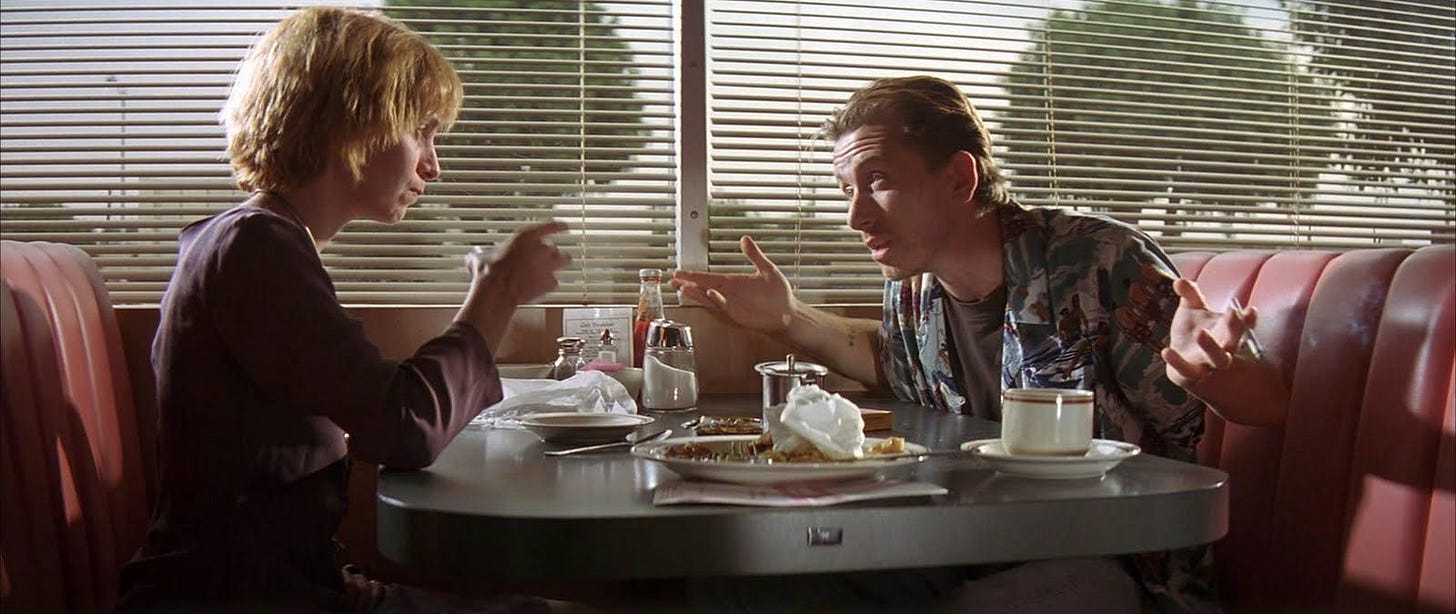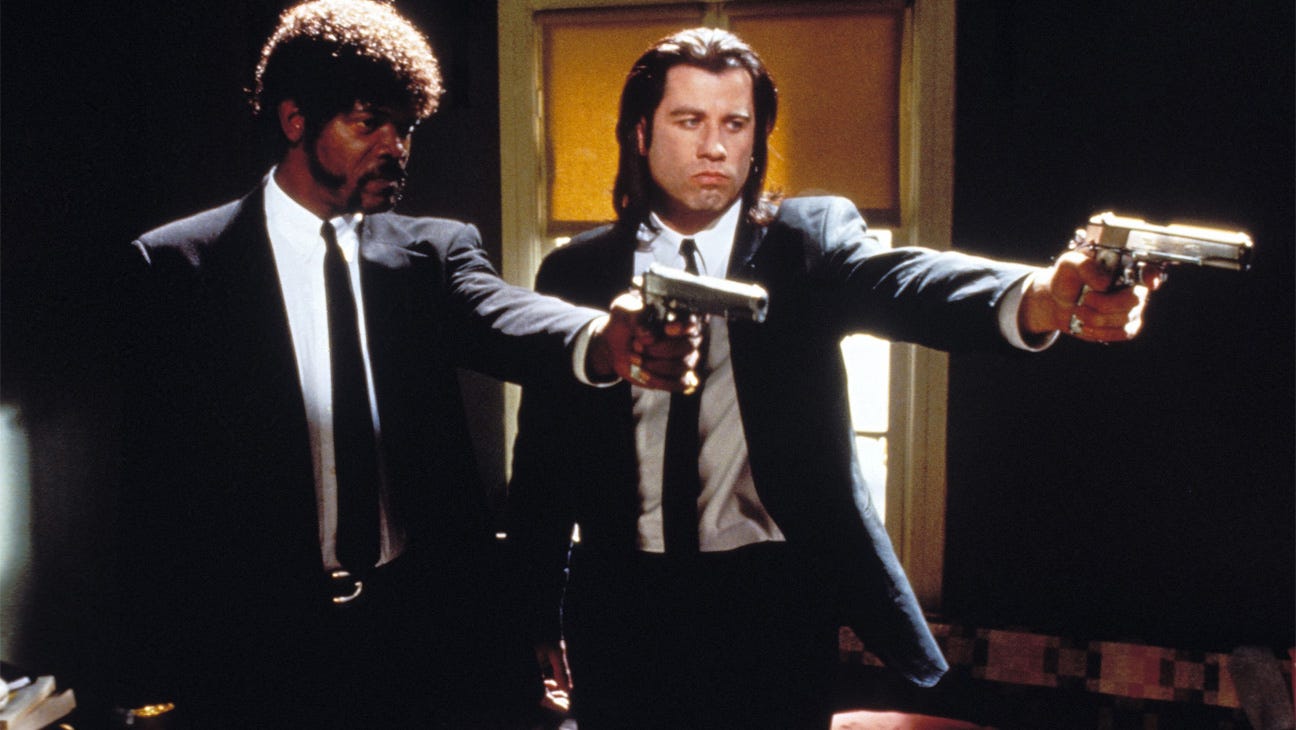Part 20 - 'Pulp Fiction' Is Violent Scream Of Twisting Adrenaline
How exactly was my first Tarantino viewing experience?
Before being welcomed into the world of Tarantino, I knew very little about him. Well, aside from the hatred of Marvel and the overt love of feet. In my mind, he was the director-in-chief of the ‘film-bro’ cult. He spearheaded the campaign for masculine-oriented cinema. He always seemed to fall in line with The Wolf of Wall Street. By that I mean the rampant booze and coke-fuelled ogling of the ‘conventionally-attractive’ female form. It was kind of gross, to me. But, when it came to Pulp Fiction, I attempt to push this image away from my mind. After all, this process is partially about broadening my sometimes narrow thinking. I’ve been indulging in so many classics recently that it felt wrong to stunt this growth. And I did just watch Asteroid City, so I was getting the cravings for some real, human action.
Pulp Fiction definitely ended up being an enriching viewing experience. I now feel more ready to call myself ‘film literate,’ but that may be jumping the gun just a tad. Even so, it was exciting to feel more prepared when conversing with film lovers around me. I am currently working my way through three film lists: my own personal watchlist, my followers recommendations and the recommendations from my dad. However, what I usually fall to prey to doing is neglecting all three, opting for something entirely random or something I’ve just heard of. In this case, it was a spontaneous choice as most people just assume I’ve seen Tarantino’s back catalogue. One can only imagine the embarrassment I was doomed to face. So, after finally stepping into this post-modernist swirl of a film, I truly felt as if I had been inducted into the classics. The canon. The universally-acclaimed cinematic hall of fame.
Pulp Fiction (1994), directed by Quentin Tarantino, features a set of 4 richly interconnected stories. We open and close with a couple at a diner who go by the pet names, Honey Bunny (played by Amanda Plummer) and Pumpkin (Tim Roth.) They are planning how exactly to rob the diner. We then follow the thread of hitmen Vincent Vega (John Travolta) and Jules Winnfield (Samuel L. Jackson) as they follow the orders of their boss, Marcellus Wallace (Ving Rhames.) They are trying to retrieve his briefcase which contains an item unknown to the audience. They later attempt to cover up a horrific accident. We pursue an evening with Vincent and Marcellus’ wife, Mia Wallace (Uma Thurman.) They twist the night away but, with a less than desirable outcome. We also follow the story of Butch Coolidge (Bruce Willis), a boxer who is working for bribe money from Marcellus. However, Butch decides to change the plan, leading to a series of graphically terrifying events.
There can be no denying the sheer genius that is Quentin Tarantino’s mind. The man is a directorial tour-de-force, as exemplified by how smoothly his stories intersect. Where we saw Asteroid City falter is where Pulp Fiction shines. There are a great number of ideas, of genres and characters being explored. But, where the films differ is the depth and fluidity of the stories themselves. Tarantino achieves an excellent circular narrative, with examples of mirroring and duality in each story. Each segment is perfectly constructed, with fade outs at the end of each sequence that are like turning over the pages of a book.
The sheer levels of intensity that Tarantino achieves throughout each story is mind-boggling. Take the scene where Mia overdoses on Vincent’s cocaine; there is an incredibly acute yet sustained burst of tension that is stomach-turning. After screaming and shouting at one another, the characters are cleverly pin-pointed into a stillness in this scene. They count down from 3 as they are about to supply Mia with an adrenaline shot, with no prior knowledge of how to do so. It is as if the audience are supplied with their own source of adrenaline as I, with shaking hands, started to feel my shirt creep up to my eyes.

The stellar casting choices underpin the film’s levels of blatant ferocity. Travolta and Jackson make for a terrific duo, who match the film’s violent air with bubbles of comedic relief. They share extended sequences of dialogue together, but they are so richly developed that it never becomes tiresome. They are fully-realised characters, with believable backstories to match. This perhaps impressed me the most, as there were whole scenes where I neglected to take any notes. I would simply stare at the characters, hanging on to each snatch of their lives that Tarantino provided. There is also a great philosophical discovery, glimpsed through the transformation of Jules. After a perceived moment of ‘divine intervention,’ Jules is shaken by the uncertainty of life which lead him to question his career choice. There is a moral ambiguity present within the duo, signalling an underlying current of nihilism in the film. This serves to, yet again, elevate it from the commonplace term of being a ‘crime-thriller.’
Willis’ Butch was another well-developed character, with a backstory served to us from the captivating tones of Christopher Walken. He becomes much more than a simple delivery mechanism for violence; he too has to face the moral implications of his perilous situations. Rhames’ portrayal of the infamous crime boss Marcellus was blotched with elements of deep sincerity. Emotional gold was struck in the shocking and sudden rape scene, where he reclaims power over those who wronged him. Thurman’s portrayal of his wife, Mia, was red-hot, slick and somewhat haunting. Though her screen-time was short, she provided us with a coked-up, twisted nightmare, all wrapped up in a white shirt and black trousers. With her half-lidded eyes and oil-spill bob, she sent this film to the heights of pop-culture fame.
The cinematography is sweeping, bloodied and tinged with echoes of a previous era. For instance, when we enter the 50s inspired diner “Jackrabbit Slim’s,” we follow Vincent as he navigates his way towards their Chrysler booth (which is, in this case, a literal car where you can eat.) We are invited to take in the clashing patterns, the neon signs, the mini toy cars that race around the seats. Under the dim lighting, there is something to be spotted in every corner, in this cool-cat underworld. It felt otherworldly, intoxicating and all-consuming. Marilyns and Janes and Elvises sweep their way from table to table, taking orders, all whilst set to the echoing haunt of a 50s soundtrack. The choice in sound was second to none, with a distinctly too-cool-for-school feel radiating from the speakers with songs like ‘Bustin’ Surfboards’ and ‘Misirlou.’
There were few negatives to take away from such a cinematic achievement. I found that, as the plot morphed and reformed, it started to lose me ever so slightly. This is in specific reference to the story of Butch and Marcellus. It was definitely hard to wrap my head around the fact that a man had just been killed and then, we’re watching a rape scene with a literal gimp standing in the corner. It felt out of place, and could perhaps have been limited to Butch’s attempts to escape Marcellus. By extension, Butch’s story continued to feel unrealistic and jarring. His connection to his girlfriend Fabienne (Maria de Medeiros) lacked chemistry and was fraught with unnatural dialogue.
This lack of realism continued as Tarantino himself turned up in the film’s final act, portraying the neighbour who assists Vince and Jules with their horrendous accident. I did find it humorous, seeing him play such a nerdy dweeb after creating such a bloody firework display. However, his acting was poor and sought further to break the realism of the film. I also don’t think casting yourself in a film, just so you can say a slur 6 or so times, is a wise choice. So, for these reasons, Pulp Fiction has earned itself an impressive 4/5.
I have been made very aware that I have played a risky card, giving this stomach-turning tale of doubles a 4/5. However, as the days trundled along and I sat down to write this review, I found that it left a very minimal lasting impression on me. Yes, it was a work of genius, a paragon of film making. However, it failed to stick with me. Maybe it’s the sheer levels of aggression that Tarantino cultivates that made me glad to see the back of it. Maybe it was the testosterone-stink that permeated its air. But, whilst I recognise its achievements and impact on pop culture as a whole, it failed to achieve the same impact upon me. However, this does not the mark the end of my Tarantino endeavours. I will be back for more, as always, with empty plate and rumbling stomach. And hopefully next time, it shall be a little more palatable and a little more fulfilling.
BellaWatchesFilms





